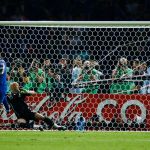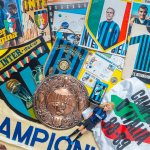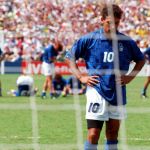
Predictable penalty kickers' society
Risk, play and science: a brief essay by Matteo Bottini on the meaning of penalties
January 30th, 2019
Penalties are one of the most dramatic and evocative moments of The Beautiful Game.
They are a game within the game, the pitiless and unfair battle between two individuals. The unbalanced probability of success is the key to the tension within the penalty: the most likely outcome is the goal or the most important event in football, the rest is the exception.
Even those who have never been in front of the penalty spot can empathize with the two human beings who find themselves in that painful situation that will leave only one alive. For these and other reasons on the rigors have been dedicated songs, poems and books: today we are proud to publish on nss sports this short essay signed by Matteo Bottini on the semiotics of shooting from 11 meters.
(Filippo D'Asaro, nss sports editor-in-chief)
Predictable penalty kickers' society
Against prediction and assured success
by Matteo Bettini
Game, risk, prediction, uncertainty, losing or winning, a cycle that keeps on going on and on. These are the element of football and of the penalty kick, an eleven meters shot that can be taken as a model of unpredictability to apply to everyday life. We’re referring to the penalty kick as a game and a meeting point between two entities, and to penalty kickers as creative actors and heroes of the imponderable.
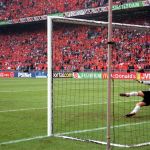
The Game
Playing is a human activity on the same level as thinking and doing. Its ability to project us into a parallel world, for a specific period of time, has played a great role in inspiring us to create rules and a variety of scenarios. The game is a metaphor of conflicts, conquests, travels and other real-life situations. Precisely for these reason players can relate to each other and act seriously, being fully aware of their own choices, using what they would do in their daily life as an inspiration. Playing serves as a simulation that provides models of interaction and interpretation suitable for the reality we live in, promoting the development of intersubjective decision-making processes. A game, a very simple one, will be the starting point for the analysis of aspects and scenarios of our society: the penalty kick.

Penalty Kick
Football, as any other game, has rules that define it: the penalty kick is one of them. We are not going to explicitly talk about when it is used, but we will delete what happens before and after it and treat it as a game in itself. But why penalty kicks? Let us analyse the dialogic nature of the penalty kick as a one to one relationship model applicable in real life, and as a model of relation and communication in contrast to modern digital interactions.
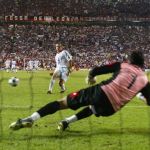
We are now going to look at the silent dialog between the protagonists of this scene: on one side the shooter, eleven meters away from its goal, literally. He puts the ball on the penalty spot and takes usually a few steps back, maybe giving his “enemy” the back, or staring him straight in the eyes, or perhaps he is looking somewhere else. On the other side the goalkeeper has to decide whether to jump cluelessly in a random direction or to try to find hints in his rival’s eyes. Both of them will have a tendency to maximise their opposite but strictly connected aims, because one’s victory means the other’s defeat. This situation will never allow a tie, a possibility of balance: there’s only a winner and a loser.

The perfect penalty kick
When it comes to social interactions, we tend to follow a specific set of rules hoping to maximise our results. We seem to do the same when playing a game, seeking the help of manuals and tricks to win and assure ourselves a good result. Penalty kicks are no strangers to this optimising mechanism that tuns on in most of us, and a big number of experts have tried to find the perfect formula that leads to the perfect penalty: the key to happiness, a practical guide to an assured victory. A 5-6 steps run-up at a 20/30 degrees angle from the upper corner of the goal and a shot reaching at least 105 kilometres per hour, should guarantee the kicker’s score. However this formula doesn’t take into account any element of distraction that will inevitably affect the efficiency of the kick. Experts tried to use science to reduce the chances of failure, forgetting to consider the real and only factor that makes football matches so popular, unpredictability, fate - the only reason we still watch 22 players kick a ball. In 1988 W. Kuhn wrote a scientific article about penalties: Penalty Kick Strategies for Shooters and Goalkeepers.
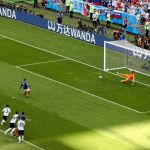
Like many he too tried to define the perfect kick: a kick at average speed (20,83 millimetres per second) takes 600 milliseconds to reach the goal. A very fast kick 27,77 millimetres per second, takes 400 milliseconds to reach the goal. Kuhn demonstrated that the goalkeeper can only save a 20,83 millimetres per second penalty kick by starting his movements right when the shooter’s foot hits the ball, or before. Even if we wanted to give the goalkeeper a manual on how to defend the goal, we realise by reading the above that the kick is not seen as a human action but it is reduced to a simple cause-and-effect event. The formula mentions the effect of the act, without ever considering who did it, the penalty kicker, taking the focus away from the human element and forcing us to look at this experience strictly as a physical and mathematical fact, made of numbers and variables. According to this definition, even the best goal keeper in the world would have to act out of instinct, his attempt to save a penalty being only a bet, a hint, product of fate and coincidence.

Risk and prediction
In a game like this, both for the possibility of an own mistake and the rival’s prediction, the exposure to risk is quite high. We are talking about a ludic kind of risk, of course, but the involving nature of the game and its realistic traits make it difficult for the players to take choices lightly. Taking in consideration this risky nature we can define the relationship between this sport act and the concept of “alterity”: if we picture the penalty kick as a meeting, a crossroad, a dialog between two men that only have intuitive information at disposal and not a single certainty of what is going to happen, we realise how difficult it would to make a choice, to take action. Choosing can lead to mistakes and taking this risk is not easy in a game where the identity of the player is a direct representation of his own person. Football has precise time, space and action limits, but the player’s role is extremely close to be the direct representation of his real person: his off and on field body and abilities coincide, and the consequences of the outcome of the match will affect directly or indirectly his real life. In this game, as in any other, there is not a distinct separation between the ludic dimension and the real dimension, we are attending a performance, a play without a script. In contrast, when we play a virtual game, we are just puppeteers of a fictional character, and once we switch the console off we can forget about our defeats. Many systems of social interconnection are programmed using mathematic algorithms and take consideration of what we like only, originating a safe and content homogenous bubble. This surely helps us and makes the elaboration of a thought an easy process, erasing all those other paths we didn’t choose (cfr. Han 2018). The prevision of human thoughts and moves are the centre of technological research and more and more software use these mathematical calculations with the aim to discretize what will never be possible to discretize: the human factor.
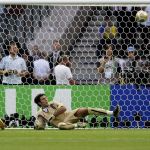
Predictability is taken for granted in our mental processes but by walking different path and by going off road, we could come across something different and potentially dangerous, but also incredibly true. On online social platforms is easy to delete what doesn’t suit our taste or doesn’t meet our interests, the same happens in video games where losing seems not to be an option anymore. Making mistakes and losing helps to build stable relationship and identities, to make a mistake means to take an initiative and face its consequences, and learn from it. The idea of eternal victory or the possibility to quit after too many defeats (rage-quitting), does not have a constructive nature, they only make us more self-centred individual and less aware of who surrounds us. Failing a penalty before sixty thousand people and undermining the outcome of the ninety minutes previously played or even the entire season, will most likely want us to select that “quit the game” button, but this cannot happen, and does not have to. If we really could avoid that moment, we would erase completely the concept of defeat, becoming fragile beings unable to face bigger failures, killing the antibodies that make us overcome those every-day obstacles (cfr. Han 2018). Penalties, for its nature, do not allow gratification for who fails: you are put in front of your mistake. If we take the shooter out of the game’s dimension, he is simply a person that has to make a choice in a unsure situation, having to combine technique and luck, prevision and fate, calculations and inventive.
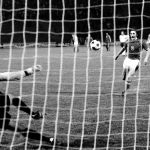
The role of case
Using Roger Caillois’s game classification in Agon, Alea, Mimicry e Ilinx as a starting point, we can say that penalties have a peculiar and interesting nature. If we were asked to put football in one of the categories listed above, we would most likely label it as a competitive game (Agon), but looking closely we would recognize its undeniable element of casualty (Alea). For sure it is an intentional action result of abilities and training, but it also hides unpredictable factors, hard to link in a cause-effect relationship. Men are never fully control of theirs own game and maybe this is the reason why it is worth to play it repeatedly. What makes a game a game is the possibility to be replicable, and penalties are nothing but a repetition of the previous ones and the anticipation of the next ones: like a ritual that follows specific rules and default procedures. Every moment seems like the original due to the game’s repetitive nature (cfr. Critchley 2016). A shoot from eleven meters it’s always the same but, at the same time, always different, thanks to the uncertainty of the result. It can be difficult to understand which role fate plays in football. The audience is often convinced that players have control over everything, even over irrational situations. This turns the athletes from heroes, myths, legends, into scapegoats, traitors, criminals.
It is hard to think that there is, only partly, a spectrum of random possibilities not written by our will. Penalties seems to be the uncertain peak in the discipline of football, stressing the importance of human choice over technique. We can define the penalty kick as the sum of a voluntary act and an external factor, unconscious, not predictable, run by the context, by the match, by the shooter’s human nature, by an idea. Right in this prospective we come across the concept of fate one more time, like if it was a window that allows us to see a back road, an occasion to escape the most obvious path. Fate cannot be explained by an algorithm, and gives us the possibility to think outside the box, making us change our point of view and giving us the chance to make room for inventive. These traits are at the base of successful human interactions and have the power to turn a normal acts into a unique and once-in-a-lifetime experiences. (cfr. Finnegan 2009). Thanks to fate we can imagine that a central kick, shot after a violent run-up, can trick the goalkeeper to jump to one side, while the ball flies above his head and hits the net. There is also another possibility in this crazy scenario: instead of jumping to one side, the goalkeeper stands still and blocks the ball right before it crosses the goal line. He looks you straight in the eyes and smiles, because he anticipated your intentions without any sure remote possibility of prediction.
Long live fate, long live risk.







